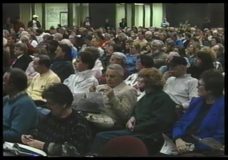Studs Terkel
Raw footage of Studs Terkel being interviewed by Bernard Shaw in Chicago. This interview covers all of Terkel ‘s famous habits – his red shirt and shoes, the fact that he can’t drive, his wife’s death, his rejection of computers, his ineptness with a tape recorder, etc. About his early law eduation: “I was a romantic, you know. I dreamed of Charles Darrow and I woke up to Julius Hoffman.” Terkel talks about his love of the CTA bus, which enables him to read and talk to people. He describes his process of collecting material for his books. ” I call myself a gold prospector… [after I interview someone] there’s transcripts, maybe 100 pages. That’s ore. There’s some gold in it. The prospector sifts. I may find eight pages. That is the gold.” After living for 90 years, Terkel is still vital – “I want my epitaph to be” ‘Curiosity did not kill this cat!’ About his new book “Will The Circle Be Unbroken?,” Terkel describes the potentially morbid subject (death) as the ultimate intellectual question. “You can’t discuss life unless you discuss the fact that it’s finite.” “I have a faith, but it’s a here and a now. I do envy those who have a faith, because if they believe that it gives them solace.” About his love of Chicago: “Chicago turned me on the first day I came here. I had asthma all my life in New York, but when that wind blew down from the stock yards, my asthma was cured!” He also links the feminist movement and the gay rights movement to the civil rights movement, then describes his reasons for voting for Ralph Nader over Al Gore: he hopes for the formation of a “second party” (considering the Republicans and Democrats to be essentially the same party). He describes racism as a problem caused by those in power to pit the underclasses against each other. He also praises his famous journalist friends. “Mike Royko was like no journalist ever… First of all, he had a style – every word, every phrase had to be right…” He ends the interview by talking about his experiences being persecuted during the McCarthy era. “To this day people think I was heroic, but it wasn’t that – I was scared stiff – but my ego was at stake!”

![[Studs Terkel interview for Charlie Rose, part 1]](https://mediaburn.org/wp-content/uploads/2018/02/645595556_640-228x160.jpg)

![[Rocking the Boat raw: Bughouse Square #1]](https://mediaburn.org/wp-content/uploads/2018/02/653863715_640-228x160.jpg)
![[Studs Terkel talks about Joe and Gaynell Begley]](https://mediaburn.org/wp-content/uploads/2018/02/653863706_640-228x160.jpg)
![[Stock Market Observer interviews Studs Terkel]](https://mediaburn.org/wp-content/uploads/2018/02/645352318_640-228x160.jpg)